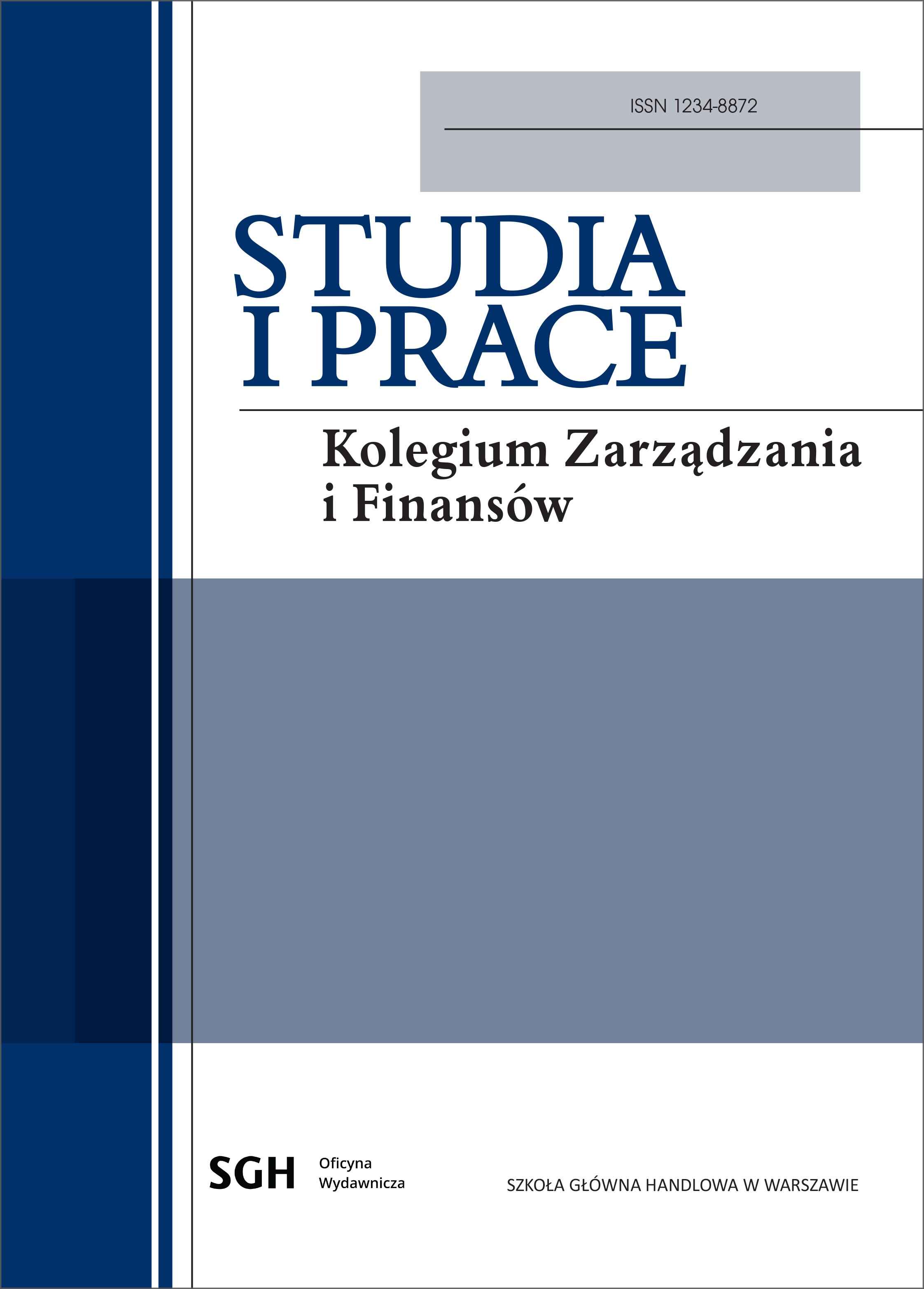Responsible Management and Irresponsible Effects of COVID-19 Pandemic in a Hybrid Enterprise
DOI:
https://doi.org/10.33119/SIP.2022.184.9Keywords:
hybrid enterprise, COVID-19 pandemic, responsible management, practices of responsible managementAbstract
The transition towards the application of responsible corporate management practices requires changes in many areas of enterprise operations. An additional challenge is their implementation under the conditions of changes in enterprise operations caused by the COVID-19 pandemic. One of the courses of action at this time is to adopt a management strategy that considers the balance of social, environmental and economic interests. The purpose of this article is to analyse responsible management practices undertaken by enterprises in the area of management with particular emphasis on the impact of the SARS-Covid-2 pandemic. Conclusions rely on the results of research carried out in July 2021 on a research sample of 1007 purposively selected small, medium and large enterprises as part of the research project entitled “Responsible Management Barometer” conducted by the Institute of Management of the Warsaw School of Economics (SGH).
Downloads
References
2. Badania statutowe Instytutu Zarządzania, nr KZiF/S21/1.55, przygotowane w ramach dotacji MNiSW na utrzymanie i rozwój potencjału badawczego KZiF w 2021 r., pn. „Barometr odpowiedzialnego zarządzania”.
3. Beland L.‑P., Brodeur A., Wright T. [2020], The short-term economic consequences of Covid-19: exposure to disease, remote work and government response, IZA Institute of Labor Economics, https://www.iza.org/publications/dp/13159/the-short-term-economicconsequences-of-covid-19‑exposure-to-disease-remote-work-and-government-response.
4. Brakman S., Garretsen H., van Witteloostuijn, A. [2020], The turn from just-in-time to justin case globalization in and after times of COVID-19: an essay on the risk re-appraisal of borders and buffers, „Social Sciences and Humanities Open”, vol. 2, no. 1, s. 1–24.
5. Brown R., Rocha A. [2020], Entrepreneurial uncertainty during the COVID-19 crisis: mapping the temporal dynamics of entrepreneurial finance, „Journal of Business Venturing Insights”, 14.6. BSR/GlobeScan [2019], The State of Sustainable Business 2019, Results of the 11th Annual State of Sustainable Business Survey, https://globescan.com/wp-content/uploads/2019/11/BSR-GlobeScan-State-of-Sustainable-BusinessSurvey-FinalReport-12Nov2019.pdf, dostęp: 22.03.2020.
7. Carroll A. B., Adler N. J., Mintzberg H., Cooren F., Suddaby R., Freeman R. E., Laasch O. [2020], What ‘are’ responsible management? A conceptual potluck, w: The Research Handbook of Responsible Management, red. O. Laasch, R. Suddaby, R. E. Freeman, D. Jamali, Edward Elgar, Cheltenham.
8. Chek I. T., Mohamad Z. Z., Yunus J., Norwani N. M., Corporate social responsibility (CSR) disclosure in consumer products and plantation industry in Malaysia”, „American International Journal of Contemporary Research”, vol. 3.
9. Dow Jones [2009], Dow Jones Sustainability Indexes, Corporate Sustainability, http://www.sustainabilityindexes.com/07_htmle/sustainability/corpsustainability.html.
10. El Goul S., Guedhami O., Kwok C., Mishra D. R. [2011], Does corporate social responsibility affect the cost of capital?, „Journal of Banking and Finance”, vol. 35.
11. Elkington J. [1994], Towards the Sustainable Corporation: Win-Win-Win Business Strategies for Sustainable Development, „California Management Review”, 36 (2), s. 90–100.
12. Guthrie J. [1993], Australian public business enterprises: analysis of changing accounting, auditing, and accountability regimes, „Financial Accountability and Management”, vol. 9, no. 2, s. 101–114.
13. Keijzers G. [2002], The Transition to the Sustainable Enterprise, „Journal of Cleaner Production”, 10 (4), s. 349–359.
14. Kuckertz A., Brändle L., Gaudig A., Hinderer S., Morales Reyes C. A., Prochotta A., Steinbrink K. M., Berger E. [2020], Startups in times of crisis – A rapid response to the COVID-19 pandemic, „Journal of Business Venturing Insights”, 13, e00169. DOI:10.1016/j.jbvi.2020. e00169.
15. Pache A., Santos F. [2013], Inside the hybrid organisation: selective coupling as a response to competing institutional logics, „Academy of Management Journal”, vol. 56, no. 4, s. 972–1001.
16. Preston L. E., O’Bannon D. P. [1997], The corporate social-financial performance relationship: a typology and analysis”, „Business and Society”, vol. 36.
17. Raport Forum Odpowiedzialnego Biznesu [2020], Opinie Polek i Polaków i Ocena Działań Pracodawców, kwiecień.
18. Skelcher C., Smith S. [2015], Theorising hybridity: institutional logics, complex organisations, and actor identities: the case of non-profits, „Public Administration”, vol. 93, no. 2, s. 433–448.
19. Tulder R., Van Tilburg R., Francken M., Da Rosa A. [2014], Managing the Transition to a Sustainable Enterprise, Abingdon, Routledge.
20. Zahra S. A. [2021], International entrepreneurship in the post COVID world, „Journal of World Business”, 56, s. 101–143.









